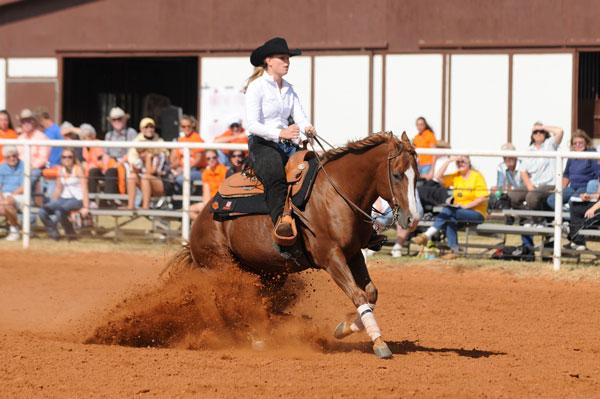
Biosecurity for Horses
Friday, June 17, 2016
Owning a horse is an investment. Participating in events where horses mingle increases their exposure to many diseases that can spread from horse to horse.
Equine herpes virus, or EHV, is a family of viruses named by numbers such as EHV-1, EHV-2 and so forth. These viruses are common worldwide. Most horses have been exposed to them by two years of age without serious side effects.
EHV-1 is associated with a wide variety of health risks, including abortion, respiratory infection, disease in newborn foals and, rarely, neurologic disease. It is unknown why some horses develop serious neurologic disease after infection with EHV-1.
Equine herpes myeloencephalopathy, or EHM, is the name associated with the neurologic disease related to equine herpes virus infection. Neurologic signs can include decreased coordination, urine dribbling, hind limb weakness, lethargy and inability to rise. These horses may lean against a wall or fence for balance.
There currently is no vaccine for the prevention of this devastating neurologic form of equine herpes virus. There are vaccines available to reduce the risks of abortion and respiratory disease associated with EHV-1 infection.
Here are some biosecurity tips to help owners keep their horse healthy and support a well-functioning immune system.
Make good forage in the form of pasture or good quality hay the basis for your horse’s ration.
Consult your veterinarian on a plan to control internal parasites on your farm. Provide a fecal sample for on each horse to evaluate their internal parasite status.
Your veterinarian will recommend a vaccination program that will work best for your horse. Well vaccinated horses are able to handle disease challenges that may overwhelm the unvaccinated horse.
Try to reduce the stress placed on your horse. Stress is a significant factor in the development of some diseases. Stress impacts the normal function of the immune system. Horse shows themselves can be stressful. Help reduce stress on your horse by training it to load and haul calmly before you begin shipping your horse to trail rides, rodeos and horse shows.
Your horse’s conditioning program should follow your competition expectations. Don’t ask for more from your horse than you have practiced at home. Don’t overwork your horse; keep it comfortable, well fed and always hydrated.
When stabling your horse, place a tack stall between your horse and the next horse if possible. EHV-1 can be spread via indirect contact. Do not share equipment or tack. Use only grooming tools, bridles and saddles designated for your horse.
Do not share towels, buckets, halters or lead ropes. You would not share a hair brush or comb with your friends; follow that same principle with your horse. Label water and feed buckets for each horse and only use those buckets for your horse.
Avoid using stock tanks shared by many horses at an event with horses from different locations.
If using the same hose to water multiple buckets for different horses, do not submerge the hose in the water. Hold the nozzle above the water. It is best to use a hose without a sprayer as the sprayer can force disease agents into the air to be inhaled by your horse.
Use different wheelbarrows for cleaning stalls and feeding hay or grain.
Avoid horse to horse contact. Do not let your horse visit with other horses. Do not touch multiple horses without washing your hands as your hands can spread disease. Wash your hands frequently to reduce the spread of disease.
Monitor your horse for signs of illness. Practice taking your horse’s temperature at home. Your horse should be accustomed to having its temperature checked daily. A fever may be the first sign of illness in your horse. The earliest sign of EHV-1 is an increase in your horse’s temperature.
Do not take your horse’s temperature after work or exercise as it will have increased due to activity. Normal horses have a body temperature under 101.5⁰F. Report a fever over 102⁰F to your veterinarian or at the show, report any signs of illness to the event or show manager.
Be responsible. Stay home if your horse shows any signs of illness. Note any signs of coughing, runny nose or eyes, or quiet attitude. Horse shows are important and so is the health of all horses participating.
Optimize your horse’s health. Keep your horse up to date on all vaccines, including EHV-1. Proper nutrition, conditioning and parasite management will help keep your horse’s immune system in top shape.
For more information, contact Dr. Kris Hiney, assistant professor in the Department of Animal Science at Oklahoma State University (khiney@okstate.edu; 405-744-9291) or Dr. Elisabeth Giedt, director of continuing education, extension and community engagement at Oklahoma State University’s Center for Veterinary Health Sciences (giedt@okstate.edu; 405-744-7672).
